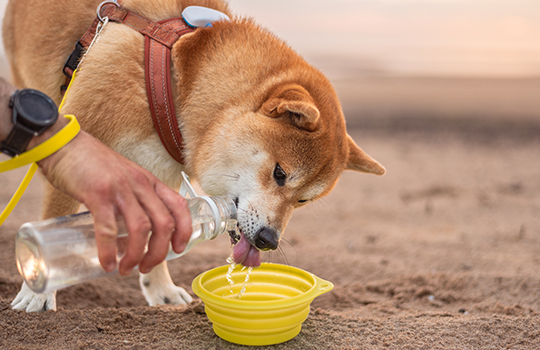As summer sets in across the United Kingdom, and we look forward to the long, hot days and evenings, it’s essential to take into account how the heat can affect the safety and comfort of our pets.
Different animals have varying needs and tolerances to heat, so it’s crucial to understand how best to care for them during a heatwave.
To help you along, this guide covers specific tips for small and large dog breeds, cats, birds, rodents, and reptiles, ensuring all our furry, feathered, and scaly friends stay safe.
Dogs: Small and Large Breeds
Small Breeds
Small dog breeds, such as Chihuahuas and Dachshunds, are particularly vulnerable to overheating.
To keep them safe:
• Provide Constant Access to Fresh Water: Ensure they always have a bowl of cool, fresh water available.
• Create Shaded Areas: Make sure they have access to cool, shaded spots, both indoors and outdoors.
• Avoid Peak Heat Hours: Walk them early in the morning or late in the evening when it's cooler.
• Use Cooling Aids: Cooling mats, wet towels, and frozen treats can help them stay cool.
• Never Leave in a Parked Car: Temperatures in cars can quickly become lethal.
Large Breeds
Larger dogs, like Labradors and German Shepherds, can struggle even more with the heat due to their size and thicker fur.
To protect them:
• Hydration and Shade: Provide plenty of water and shaded areas.
• Fur Management: Consider trimming their fur (but not shaving it entirely) to help them stay cool.
• Limit Exercise: Avoid over-exertion and keep play sessions short and preferably indoors.
• Use Fans and Air Conditioning: These can be very beneficial for keeping them cool.
• Monitor for Heat Stress: Look out for signs of overheating such as excessive panting, drooling, or lethargy.
Cats
Cats are generally adept at finding cool spots, but they still need help during extreme heat.
To keep cats comfortable:
• Access to Water and Shade: Ensure they have constant access to fresh water and shaded areas.
• Ice Cubes in Water Dish: Encourage them to drink more by adding ice cubes to their water.
• Ventilation: Keep windows open for ventilation, but ensure they are secure to prevent escapes.
• Cooling Mats: Provide cooling mats for them to lie on.
• Monitor for Heat Stress: Be aware of signs such as panting, drooling, or seeking cool areas excessively.
Birds
Birds are particularly sensitive to heat and need extra care during a heatwave. To protect birds:
• Shade: Place their cages in shaded areas, away from direct sunlight.
• Misting: Mist them with water using a spray bottle to help them cool down.
• Bathing Dish: Provide a shallow dish of water for them to bathe in.
• Ventilation: Keep their environment well-ventilated, but ensure airflow isn’t directly on them.
• Hydrating Foods: Offer fresh fruits with high water content, like melons, to help keep them hydrated.
Rodents
Rodents, such as hamsters, guinea pigs, and rabbits can quickly overheat, as they’re oftentimes confined for longer periods in cages, runs or pens which limits their freedom of movement.
To ensure their safety:
• Avoid Direct Sunlight: Keep their enclosures out of direct sunlight and ensure they are well-ventilated.
• Cooling Aids: Provide ceramic tiles or frozen water bottles wrapped in towels for them to lie against.
• Fresh Water: Regularly change their water to keep it cool and fresh.
• Limit Handling: Avoid handling them too much during the hottest parts of the day to prevent increasing their body temperature.
Reptiles
Reptiles like snakes, lizards, and tortoises are ectothermic, relying on external heat sources to regulate their body temperature. During a heatwave, it’s essential to:
• Monitor Enclosures: Ensure there are cooler areas within their habitat where they can retreat.
• Avoid Additional Heat Sources: Avoid using heat lamps during peak temperatures.
• Maintain Humidity: Mist their enclosure with water to maintain humidity.
• Provide Fresh Water: Ensure they have access to fresh water for hydration.
• Monitor for Heat Stress: Watch for signs such as lethargy, open-mouth breathing, or seeking cooler areas excessively.
Protecting pets during a heatwave requires attentive care and specific strategies tailored to each species. By providing shade, hydration, and cooling methods, you can help your pets stay safe and comfortable even during the hottest days.
Always monitor your pets for signs of heat stress and consult a veterinarian if you have any concerns about their health during extreme weather conditions. With the right precautions, we can ensure all our pets remain happy and healthy throughout the summer.




